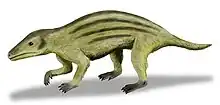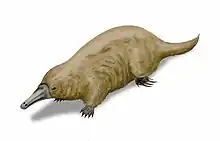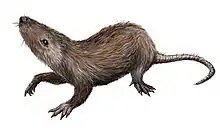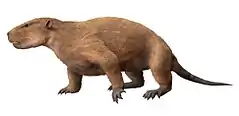Allotheria
Allotheria (meaning "other beasts", from the Greek αλλός, allos–other and θήριον, therion–wild animal) is an extinct clade of mammals known from the Mesozoic and early Cenozoic. Shared characteristics of the group are the presence of lower molariform teeth equipped with longitudinal rows of cusps[1] and enlarged incisors.[2] Typically, the canine teeth are also lost.[2] Allotheria includes Multituberculata, Gondwanatheria (which may be part of Multituberculata, as the sister group to Cimolodonta),[3][4][5][6] and probably Haramiyida,[7] (sometimes only including Euharamiyida[2]) although some studies have recovered haramiyidans to be basal mammaliaforms unrelated to multituberculates.[8] Allotherians are often placed as crown group mammals, more closely related to living marsupials and placentals than to monotremes or eutriconodonts.[2]
| Allotheria Temporal range: Possible Late Triassic record | |
|---|---|
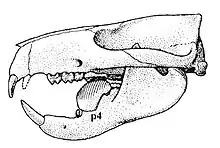 | |
| Skull of Ptilodus (Multituberculata) | |
 | |
| Skull of Adalatherium (Gondwanatheria) | |
| Scientific classification | |
| Domain: | Eukaryota |
| Kingdom: | Animalia |
| Phylum: | Chordata |
| Class: | Mammalia |
| Clade: | Theriiformes |
| Infraclass: | †Allotheria Marsh, 1880 |
| Subgroups | |
| |

References
- Butler, P.M. (2000). "Review of the early allotherian mammals". Acta Palaeontologica Polonica. 45 (4): 317–342.
- Hoffmann, Simone; Beck, Robin M. D.; Wible, John R.; Rougier, Guillermo W.; Krause, David W. (2020-12-14). "Phylogenetic placement of Adalatherium hui (Mammalia, Gondwanatheria) from the Late Cretaceous of Madagascar: implications for allotherian relationships". Journal of Vertebrate Paleontology. 40 (sup1): 213–234. Bibcode:2020JVPal..40S.213H. doi:10.1080/02724634.2020.1801706. ISSN 0272-4634. S2CID 230968231.
- Krause, D. W.; Prasad, G. V. R.; von Koenigswald, W.; Sahni, A.; Grine, F. E. (1997). "Cosmopolitanism among Gondwanan Late Cretaceous mammals" (PDF). Nature. 390 (6659): 504–507. Bibcode:1997Natur.390..504K. doi:10.1038/37343. S2CID 205025618. Archived from the original (PDF) on 2010-06-11.
- Krause, David W.; Hoffmann, Simone; Wible, John R.; Kirk, E. Christopher; Schultz, Julia A.; von Koenigswald, Wighart; Groenke, Joseph R.; Rossie, James B. (2014-11-05). O'Connor, Patrick M., Seiffert, Erik R., Dumont, Elizabeth R., Holloway, Waymon L., Rogers, Raymond R., Rahantarisoa, Lydia J., Kemp, Addison D., Andriamialison, Haingoson. "First cranial remains of a gondwanatherian mammal reveal remarkable mosaicism". Nature. Nature Publishing Group, a division of Macmillan Publishers Limited. 515 (7528): 512–517. Bibcode:2014Natur.515..512K. doi:10.1038/nature13922. ISSN 1476-4687. PMID 25383528. S2CID 4395258.
- Drake, Nadia (November 5, 2014). "Fossil From Dinosaur Era Reveals Big Mammal With Super Senses". nationalgeographic.com. National Geographic Society. Retrieved November 5, 2014.
- Wilford, John Noble (November 5, 2014). "Fossil's Unusual Size and Location Offer Clues in Evolution of Mammals". The New York Times. Retrieved November 6, 2014.
- Luo, Z.-X.; Kielan-Jaworowska, Z.; Cifelli, R.L. (2002). "In quest for a phylogeny of Mesozoic mammals". Acta Palaeontologica Polonica. 47 (1): 1–78.
- Luo, Zhe-Xi; Gates, Stephen M.; Jenkins Jr., Farish A.; Amaral, William W.; Shubin, Neil H. (16 November 2015). "Mandibular and dental characteristics of Late Triassic mammaliaform Haramiyavia and their ramifications for basal mammal evolution". PNAS. 112 (51): E7101–E7109. Bibcode:2015PNAS..112E7101L. doi:10.1073/pnas.1519387112. PMC 4697399. PMID 26630008.
Further reading
Zofia Kielan-Jaworowska, Richard L. Cifelli, and Zhe-Xi Luo, Mammals from the Age of Dinosaurs: Origins, Evolution, and Structure (New York: Columbia University Press, 2004), 249.
